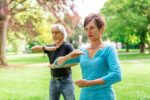ALS changed my exercise regimen, but I haven’t abandoned the habit
With a career in fitness and some trial and error, I've found workable workouts

“Do as much as you can, but be careful. And don’t overdo.” Those were the words of advice bouncing around in my head during the long drive home from one of my first ALS clinic appointments.
I’d brought a list of questions for my neurologist, including one asking if I should still exercise now that I had ALS. At the time, her advice, shared above, seemed logical. But the more I pondered, the more I felt confused. New questions bubbled up, such as what type of exercise should I do? How will I know when I’ve done too much? And what exactly happens at the too-much mark?
Why was I so concerned? Before my ALS and in my youth, I enjoyed gymnastics and dance activities, which led to a professional career teaching fitness. My life was filled with physical movement. I also knew that ALS was a muscle-wasting disease, primarily because inactivity led to atrophy. Thus, flopping down in a chair and doing nothing wasn’t the answer.
When I was diagnosed with ALS in 2010, the internet offered little in the way of helpful information about the disease, but studies were starting on the issue of ALS and exercise. The suggestions circulating in social media at the time were to minimize physical activity to conserve energy and that any exercise would make ALS symptoms worse.
Because ALS affects each patient differently and its symptoms vary from person to person, I can only share my personal experiences. They’ve occurred over 14 years of experimentation and learning to adapt what I knew about fitness to my body’s progressive needs.
Setting new goals
Is there a best type of exercise? Not definitively. The best activity for me was determined by what I enjoyed doing and could do consistently. I enjoyed swimming, for example, but during my first year with ALS the effort required to change into a swimsuit, travel to the pool, swim, arrive home, peel off my wet swimsuit, yadda, yadda, was exhausting.
I skipped more days than I swam. However, I found that if I exercised at home, which I didn’t mind at all, and used hand weights, furniture, and the floor, I kept up my consistency.
Traditionally, the three pillars or goals of most exercise programs are to maintain and improve endurance, strength, and flexibility. Living with ALS, I discovered I needed new goals.
The goal of endurance turned into learning to accommodate my body’s fluctuating fatigue. Rather than trying to do my exercise routines in one hour, I switched up my sessions to several short periods scattered throughout the day.
The goals of strength and flexibility morphed into performing a series of movements to improve my range of motion. My new priority was to maintain my overall coordination and my ability to do functional activities. These included sitting and getting up from a chair, standing, walking, rolling over in bed, and getting into and out of a car.
Would I overdo it?
Finally, I learned to listen to my body. No more pushing through fatigue. On some days, if my mind said yes but my body said no, I took note and skipped the exercise session entirely. Funnily enough, “pushing through” was mostly impossible because even if I told myself, “Dagmar, you used to knock out 10 pushups,” I had to be satisfied with a mighty two. As hard as I tried, hitting “overdo” or “too much” was unattainable.
Who knows if my exercise regimen is the reason I’m still walking (with a rollator), but I know it certainly contributed. Even though we remain a long way from beating this disease, I’ll keep doing my best to live well while living with ALS. And I hope you will, too.
Note: ALS News Today is strictly a news and information website about the disease. It does not provide medical advice, diagnosis, or treatment. This content is not intended to be a substitute for professional medical advice, diagnosis, or treatment. Always seek the advice of your physician or other qualified health provider with any questions you may have regarding a medical condition. Never disregard professional medical advice or delay in seeking it because of something you have read on this website. The opinions expressed in this column are not those of ALS News Today or its parent company, BioNews, and are intended to spark discussion about issues pertaining to ALS.








Comments
Wayne Johnson
Is there a way of emailing Dagmar to ask a ALS question?
Dagmar Munn
Hi Wayne, you can ask me here in the comments ... or join my blog's mailing list https://alsandwellness.blogspot.com/ and ask your question. Dagmar